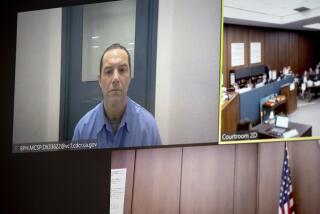San Diego
- Share via
A judge is considering whether a seldom-used technique of analyzing bloodstains gives valid results that can be used against a former California Highway Patrol officer charged with murdering a motorist while on duty.
Prosecutors believe the technique, which identifies genetically determined protein components of a person’s blood, can link Craig Peyer, 37, of Poway, to the Dec. 27 killing of Cara Knott, 20, of El Cajon.
Peyer is accused of strangling Knott and throwing her body off a 65-foot-high bridge after stopping her on Interstate 15 south of Escondido as she drove home from her boyfriend’s house. At the time, Peyer was a CHP officer.
Superior Court Judge Richard Huffman, who heard testimony Monday from the forensic serologist who did the testing, said he will rule Thursday whether the results can be used in Peyer’s trial, which is scheduled to begin Jan. 4.
Huffman said he then will hear a defense motion to exclude the testimony of 19 women who have told prosecutors Peyer stopped them under unusual circumstances or detained them longer than necessary in the months preceding Knott’s death.
Peyer’s attorney, Robert Grimes, contends the blood analysis technique that identifies so-called “genetic markers” is unreliable because results can vary depending on the testing methods used.
However, the person who conducted the tests, Gary Harmor, senior forensic serologist at Serological Research Institute in Emeryville, Calif., told Huffman on Monday that he isn’t aware of any controversy or dissension about the technique. It was first used in Western Europe in the 1960s, but is done by only a handful of crime labs in the United States because it is expensive and requires equipment not found in most U.S. forensic labs.
During Peyer’s preliminary hearing in April, Harmor testified that one of the defendant’s genetic markers is shared by only 1.3 percent of the population.
Peyer, who remains free on $1 million bond, was fired by the CHP in May after an internal investigation determined that he killed Knott. Peyer was patrolling the area of Interstate 15 where her car was found the night she disappeared. Her body was found the next day.
More to Read
Sign up for Essential California
The most important California stories and recommendations in your inbox every morning.
You may occasionally receive promotional content from the Los Angeles Times.










